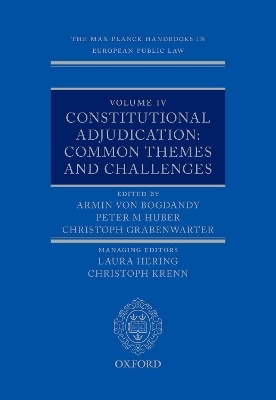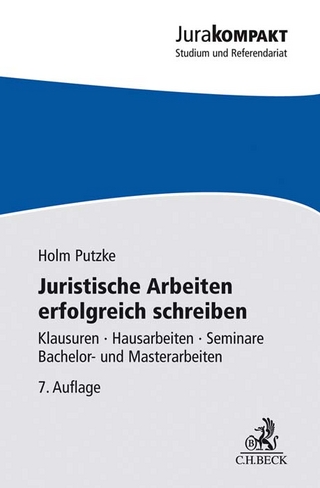
The Max Planck Handbooks in European Public Law
Oxford University Press (Verlag)
978-0-19-284669-3 (ISBN)
The Max Planck Handbooks in European Public Law series describes and analyzes the public law of the European legal space, an area that encompasses not only the law of the European Union but also the European Convention on Human Rights and, importantly, the domestic public laws of European states. Recognizing that the ongoing vertical and horizontal processes of European integration render legal comparison the task of our time for both scholars and practitioners, the project aims to foster a better understanding of the specific European legal pluralism and, ultimately, to contribute to the legitimacy and efficiency of European public law. The first volume of the series began this endeavour with an appraisal of the evolution of the state and its administration, offering both cross-cutting contributions and specific country reports. The third volume (the second in chronological terms) continues this approach with an in-depth appraisal of constitutional adjudication in various and diverse European countries. Fourteen country reports and two cross-cutting contributions investigate the antecedents, foundations, organization, procedure, and specific approach to constitutional issues throughout the Continent.
The fourth volume now compares European constitutional jurisdiction in the European legal space. It examines the structures of the organization, the appointment of judges, the procedures and the methods of argumentation and interpretation, their impact on state and society, their legitimacy as well as their role in the division of powers, and thus completes the picture following the country reports in Volume III. This comparative perspective is supplemented by an examination that illustrates the relationship with the ECJ, the ECtHR, and the Venice Commission as well as their (constitutional) function. Finally, Constitutional Adjudication: Common Themes and Challenges is devoted to the challenges constitutional jurisdiction in the European judicial area is currently facing. The historical, political, and theoretical foundations as well as the basic dogmatic features of constitutional jurisdiction are presented in such a way that the discussion about its role and further development in this legal space is sustainably stimulated.
Armin von Bogdandy is Director at the Max Planck Institute for Comparative Public Law and International Law in Heidelberg and Professor for Public Law at the University in Frankfurt/Main. He graduated in law and philosophy before obtaining a Ph.D. in Freiburg (1988) and qualifying as a professor at the FU Berlin (1996). He has been President of the OECD Nuclear Energy Tribunal as well as a member of the German Science Council (Wissenschaftsrat) and the Scientific Committee of the European Union Agency for Fundamental Rights. Professor von Bogdandy received a Dr. h.c. from the Universidad Nacional de Córdoba, Argentina (2020), the Eötvös Loránd University Budapest, Ungarn (2020), and the Universidad Nacional de Tucumán, Argentina (2017). He specializes in the general features of public law, with a focus on its structural changes, be they theoretical, doctrinal, or practical. Peter M. Huber is Justice of the German Federal Constitutional Court and full Professor for Public Law and State Philosophy at the Ludwig-Maximilians-University Munich (LMU). Following his studies at the LMU and the University of Geneva he graduated in law (1984), obtained a Ph.D. (1987), and habilitated at the LMU (1991). He previously held, among others, the Chair for Constitutional and Administrative Law, European law, Public Commercial and Environmental Law at the University of Jena (1992-2001), where he also served as dean (1994-1996). Professor Huber served numerous public offices and functions, including being a judge at the Thuringian Higher Administrative Court (1996-2002), a member of the State Court of Bremen (2007-2009), and Minister of the Interior of the Free State of Thuringia (2009-2010). Christoph Grabenwarter is the President of the Austrian Constitutional Court and full Professor for Public Law, Business Law, and International Law at the Wirtschaftsuniversität Wien (WU). Following his studies at the University of Vienna (1984-1989), he graduated in law (1988) and economics (1989) and obtained a Ph.D. in both disciplines (1991, 1994). In 2002, he accepted an appointment to the Chair of Comparative and European Public Law and Business Law at the University of Graz. He has held the Chair of Public Law, Business Law, and International Law at the Institute for European and International Law (WU) since 2006. In addition, Professor Grabenwarter has been an Ad Hoc Judge at the European Court of Human Rights (2002-2005); the President of the Austrian Jurists' Forum (since 2015); and Austrian Member of the Venice Commission of the Council of Europe since 2006 (and its Vice-President from 2015 to 2017).
1: Pedro Cruz Villalón: The Evolution of Constitutional Adjudication in Europe
2: Constance Grewe: Constitutional Jurisdiction in Ex-Yugoslavia in the Perspective of the European Legal Space
3: Christoph Grabenwarter: Judicial Appointments in Comparative Perspective
4: Rainer Grote: The Most Important Constitutional Court Proceedings in the European Legal Space
5: András Jakab: The Reasoning of Constitutional Courts in Europe
6: Maartje De Visser: Constitutional Courts Securing Their Legitimacy: An Institutional-Procedural Analysis
7: Anuscheh Farahat: Constitutional Jurisdiction and the Separation of Powers in the European Legal Space: A Comparative Analysis
8: Markus Vasek: Constitutional Jurisdiction and Protection of Fundamental Rights in Europe
9: Armin von Bogdandy and Christoph Krenn: ECJ and ECtHR: Two Senates of Europe's Constitutional Jurisdiction
10: José Martín y Pérez de Nanclares: The Cooperation of Constitutional Courts in the European Legal Space
11: Davide Paris: The Impact of EU Law and the ECHR on National Constitutional Adjudication in the European Legal Space
12: Monica Claes and Bruno de Witte: The Roles of Constitutional Courts in the European Legal Space
13: Christoph Grabenwarter: The Venice Commission: Its Nature, Functioning, and Significance in the Multi-Level Cooperation of Constitutional Courts
14: Peter M Huber: Constitutional Courts and Politics in the European Legal Space
15: Christine Landfried: Constitutional Review in the European Legal Space: A Political Science Perspective
16: Juan Luis Requejo Pagés: The Decline of the Traditional Model of European Constitutional Jurisdiction
17: Armin von Bogdandy, Christoph Grabenwarter, and Peter M Huber: Constitutional Adjudication in the European Legal Space
| Erscheinungsdatum | 16.05.2023 |
|---|---|
| Reihe/Serie | Max Planck Handbooks in European Public Law |
| Verlagsort | Oxford |
| Sprache | englisch |
| Maße | 176 x 251 mm |
| Gewicht | 1336 g |
| Themenwelt | Recht / Steuern ► Allgemeines / Lexika |
| Recht / Steuern ► EU / Internationales Recht | |
| Recht / Steuern ► Öffentliches Recht | |
| ISBN-10 | 0-19-284669-8 / 0192846698 |
| ISBN-13 | 978-0-19-284669-3 / 9780192846693 |
| Zustand | Neuware |
| Informationen gemäß Produktsicherheitsverordnung (GPSR) | |
| Haben Sie eine Frage zum Produkt? |
aus dem Bereich


